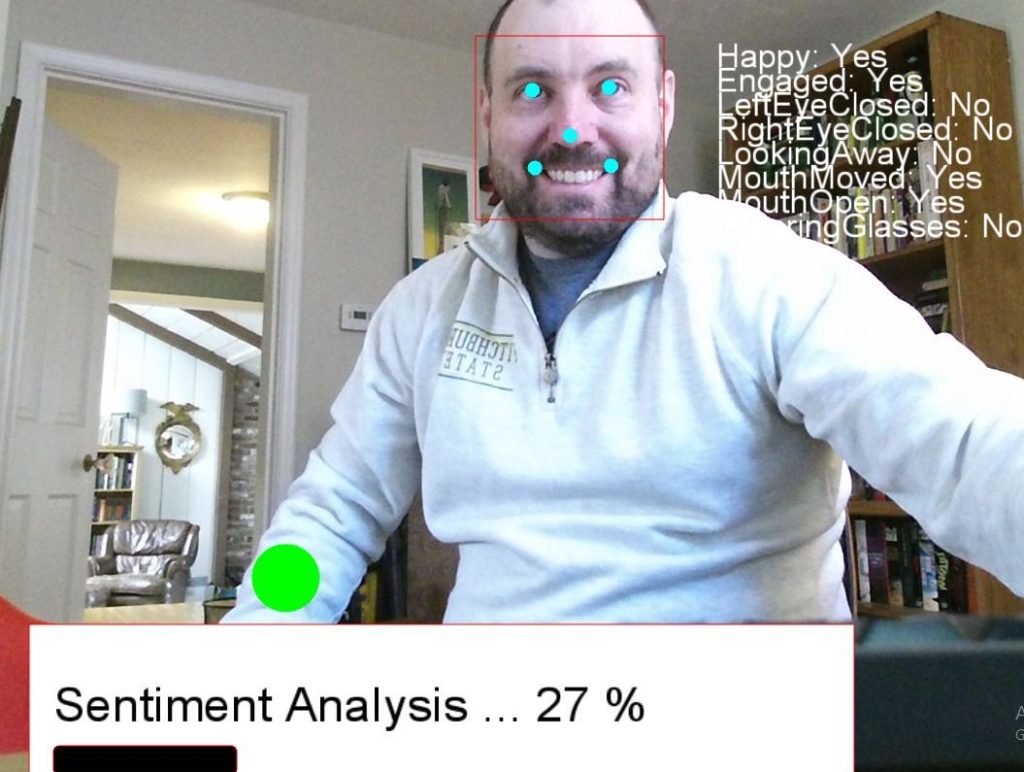Becoming Data
This insight led directly to my next interactive project. While teaching at Fitchburg State University, I secured a small grant that allowed me to hire two students to help write and code this project. Much like the Aperveillance project, this project also relies on a bit of trickery, in which the program itself acts as if it’s completing a data analysis which does not actually occur. However, it’s important to understand that in both of these cases, the trick could actually be implemented for real, but is not done so in order to protect privacy. In other words, the Aperveillance project could have displayed the images from the local webcam live to everyone via the internet, and even saved them. And the Becoming Data project could have actually completed the data analysis that it fakes. However, I’m not personally interested in violating anyone’s privacy – I simply want them to experience what such a violation feels like at a personal level that is not possible when discussing data abstractly.
Becoming Data uses a Microsoft Kinect and the Processing programming language to create an augmented reality interface in which users interact with the screen in order to start an analysis of their own data. It includes a fairly annoying terms of service agreement that must be navigated and accepted. Then the system acts as if it is performing the following tasks, with a percentage completion bar and animations for each:
- Facial Recognition Analysis
- Pinging cell phone
- Sentiment Analysis
- Social Network Analysis
- Accessing Credit Data

Next, the program shares the following results screen-by-screen, with a simple random number inserted where each bold number is included below:
-
Total Time You Spent Reading License Agreement: [Actual number recorded] seconds. This agreement was approximately 2,500 words. The average time to read this amount of text is between 8 and 20 minutes. What did you miss?
-
Analysis of recent food purchases indicates that you may be depressed! Social media channels will now feature ads for meditation apps and online therapy services 28% more frequently. If you click one of these, you may start receiving ads suggesting you are bi-polar.
-
Location-based data collected from your cell phone indicates that you have visited the gym less frequently than the national average. Your health insurance rates will rise 7% this year.
-
Based on an analysis of your cell phone battery, ride sharing services will increase your fare by about 33%.
-
Car dealerships can access your recent search history. Based on an analysis of your recent searches, if you were to visit a dealer today, they might offer you a loan with an interest rate that is 2% higher.
-
Using a 2015 patent, the creditworthiness of your friends across social media sites has been analyzed. Unfortunately, some of your friends have low scores. As some new credit card companies take this into account, your credit score could drop by as many as 171 points.
-
An analysis of all of your social media posts reveal that your posts contain 76 bad words and 115 mentions of alcohol or drugs. These may or may not be problematic in context, but they have been archived and will be reported on your next employment background check.
-
The web browser you use most frequently on your phone has been correlated with an increased likelihood to leave a job sooner than other employees. Approximately 21% of employers will not even consider your application due to the browser you use.
-
Your recent social media feeds show 65% more ads with negative sentiments recently. This increase may be due to experiments run by the company or an influx of memes by Russian-backed ads. However, this change in your feed means you are 33% less likely to vote in the next election.
-
A stress analysis of your face indicates that you are 57% unlikely to be placated by a customer service representative. If you call for customer service now you will be routed to an operator who has been specially trained to handle difficult customers. They will be unwilling to meet your requests.
This project was completed days before the COVID-19 pandemic caused schools across the country to close in early 2020, so it has had limited opportunities for sharing. However, it has been featured on my campus as part of the Speaker’s Series for the Center for Teaching and Learning and as part of classes that I taught once students returned to in-person learning.
Participants and the audience members viewing the interaction have had very strong reactions, which usually first focus on how unfair a particular result is, followed by questioning if the results are real. As I noted above, the actual results presented are fake, but all of the situations shared in the results are based on real-world patents or applications of data use. This is the best way I have found to date to make the effects of Little Brother – the use of your data by corporations – feel real and feel concerning. Our personal data can be collected and used in ways that are detrimental to not only our wallets but also our very livelihood.
Does this make you care?

